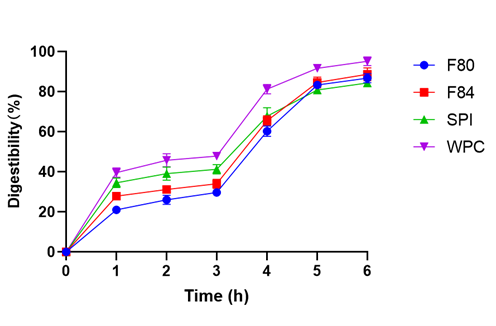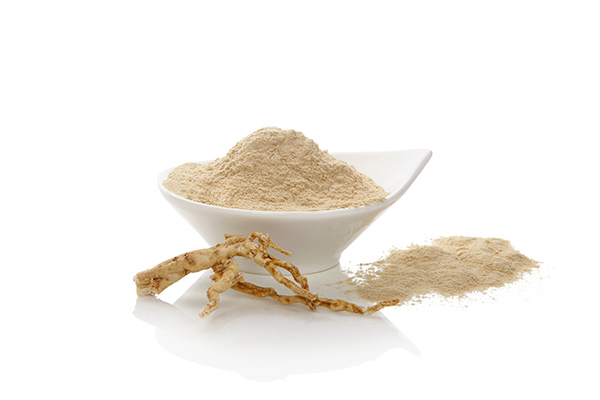-
Home > News & Events > Blog > Human Health
The digestibility of food has a significant impact on its nutritional value. Angel Yeast used an in vitro digestion model and related experiments conducted by the company to explore the digestion behaviors of different types of yeast protein (F80, F84), whey protein concentrate (WPC), and soy protein isolate (SPI).

Fig. 1 In vitro simulated digestion of several proteins
The results of in vitro simulated digestion for various types of proteins are shown in Fig 1. The simulated experiment was divided into two phases: stomach digestion (0–3 h) and intestinal tract digestion (3–6 h).
The digestion process primarily takes place in the intestinal fluid. During the intestinal tract digestion phase, the digestibility of all proteins steadily increased. The digestion curves of F80, F84, and SPI nearly overlapped, gradually reaching the digestion endpoint after about 5 hours, with a final digestibility of approximately 85%.
The experimental results clearly show that the digestion speed of both types of yeast proteins is significantly lower than that of WPC and SPI.
The slower digestion rate of yeast protein may be attributed to its tighter structure and the presence of a small amount of polysaccharides on its surface, which increases its resistance to proteolysis.
The slow-digesting yeast protein allows for the slow release of amino acids after ingestion, providing a sustained supply of amino acids to the body for a long time while increasing satiety. Additionally, yeast protein is rich in essential amino acids, and studies have shown that its Protein Digestibility-Corrected Amino Acid Score (PDCAAS) based on the FAO 2011 model for individuals aged three years and above is 1.0, making it suitable for human amino acid requirements. The branched-chain amino acid content of yeast protein exceeds 21%, comparable to that of whey protein. Therefore, yeast protein has great potential for application in weight management and sports nutrition.
References
[1] Hexiang Xie, Yuping Zhao, Kefan Ouyang, et al. Yeast protein: In vivo gastrointestinal tract digestion and biochemical characteristics. [J] Food Bioscience, (2024), 60: 104494.
[2] Songyu Wang, Fang Huang, Yuping Zhao, et al. Slow-digestive yeast protein concentrate: An investigation of its in vitro digestibility and digestion behavior. [J] Food Research International, (2023), 174: 113572.
[3] Cao X, et al. Evaluation of the Nutritional quality of Yeast protein in Comparison to Animal and Plant protein using Growing rats and INFOGEST Model. (Publishing)
| Published by Wu Ya Engineer of Nutrition and Health Division |
About Angel Human Health:
Specialized in yeast and fermentation, AHH is committed to developing innovative, differentiated, science-based functional ingredients and customized solutions, to help our customers get enduring success, as well as contribute to a healthier and sustainable world together.
About Angel:
Angel Yeast Company is a high-tech listed company specializing in yeast and biotech. Product business covers Yeast and Baking, Yeast Extract-Savoury, Nutrition & Health and Biotechnology fields. It is one of the world's leading companies in the yeast industry. Angel has 12 holding subsidiaries and provides products and services for more than 150 countries and regions.
Press Contact:
ANGEL YEAST CO., LTD
Address: 168 Chengdong Avenue, Yichang, Hubei 443003, P. R.China
Tel: +86 717 6369570
Email: Nutritech@angelyeast.com








